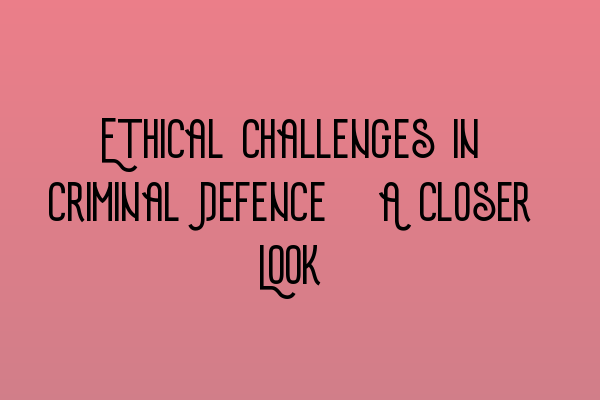Ethical Challenges in Criminal Defence: A Closer Look
Being a criminal defence solicitor comes with its own set of unique challenges. Not only do you have to navigate the intricacies of the law, but you also have to deal with ethical dilemmas that can arise in the pursuit of justice. In this blog post, we will take a closer look at some of the ethical challenges faced by criminal defence practitioners.
The Duty of Confidentiality
One of the most fundamental aspects of the solicitor-client relationship is the duty of confidentiality. As a criminal defence solicitor, you are entrusted with sensitive information that must be kept confidential. This duty extends even after the case has concluded. The temptation to disclose this information may arise in certain situations, but as a professional, it is essential to uphold the duty of confidentiality at all times.
Integrating technology into the legal profession has presented new challenges in maintaining confidentiality. With the rise of electronic communication and data storage, solicitors must be diligent in implementing robust security measures to protect their clients’ information.
Conflicts of Interest
Conflicts of interest can pose significant ethical challenges for criminal defence solicitors. As legal professionals, it is our duty to provide impartial and diligent representation to our clients. However, conflicts of interest can arise when solicitors have personal, financial, or professional relationships that may compromise their ability to act in their clients’ best interests.
To avoid conflicts of interest, solicitors must conduct thorough conflict checks before taking on a case. This involves reviewing the potential conflict of interest against the solicitor’s current and past clients, as well as their personal relationships. If a conflict is identified, the solicitor must decline the representation or take steps to mitigate the conflict with their client’s informed consent.
Professional Independence
Professional independence is crucial for criminal defence solicitors to maintain their ethical obligations. It is essential to provide objective advice and act in the best interests of the client, without external pressures or influences. This independence allows solicitors to vigorously represent their clients and ensure a fair legal process.
However, professional independence can be challenged when solicitors face conflicting instructions or pressures from clients, family members, or other third parties. In these situations, it is vital for solicitors to communicate the limitations of their representation and ensure that their actions align with their professional obligations.
Access to Justice
As criminal defence solicitors, we have a duty to ensure that our clients have access to justice. This means providing representation and assistance to individuals regardless of their financial status or social background. It is crucial to uphold this ethical principle and advocate for equal treatment within the criminal justice system.
However, limited resources and funding challenges can make it difficult to provide adequate legal representation to all clients. This creates an ethical dilemma for solicitors, as they must balance their commitment to access to justice with the practical realities of their caseload and available resources.
Conclusion
Being a criminal defence solicitor involves navigating through ethical challenges that can impact the pursuit of justice. From the duty of confidentiality to conflicts of interest, professional independence, and access to justice, solicitors must uphold their ethical obligations while providing diligent representation to their clients.
If you are preparing for the SQE 1 or SQE 2 exams, we recommend checking out our related articles:
- SQE 1 Practice Exam Questions
- SQE 1 Practice Mocks FLK1 FLK2
- SQE 2 Preparation Courses
- SQE 1 Preparation Courses
- SRA SQE Exam Dates
These resources will help you further prepare for your exams and enhance your knowledge in criminal law and practice.
